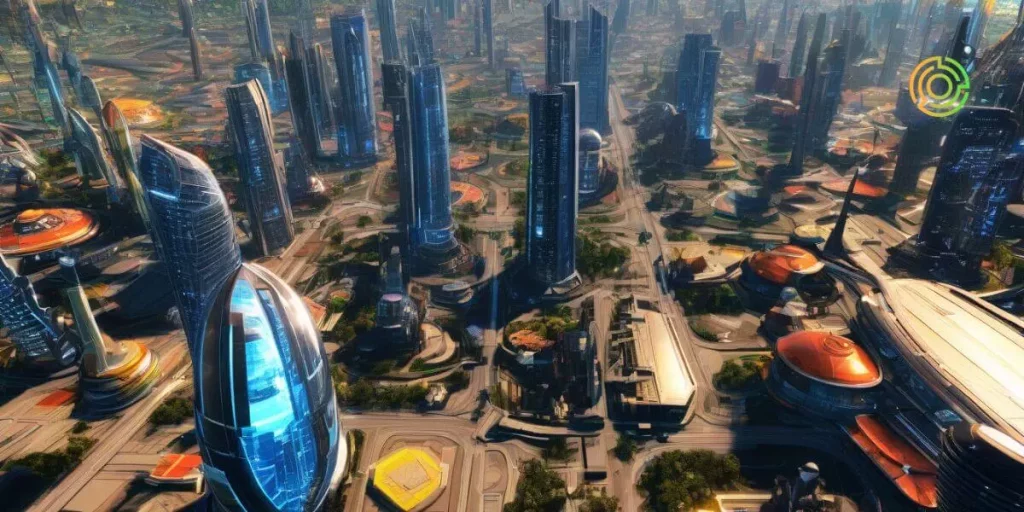Startup Hiber has integrated Google’s generative AI into its Hiber3D development platform, allowing creators to type text prompts and build expansive virtual worlds.
The goal is simplifying metaverse creation for gaming and other immersive experiences. Natural language inputs can generate environments matching moods and creative visions.
Hiber provides the tech behind its own HiberWorld metaverse with over 5 million user-made worlds. Adding AI aims to unlock more creativity for mainstream audiences.
Turning Text into Interactive Virtual Spaces
Hiber’s new AI tool lets creators describe what they want to build using natural prompts. The system then generates 3D worlds matching the text descriptions.
CEO Michael Yngfors said removing creative barriers allows anyone to bring their visions to life digitally. The AI acts as a virtual assistant for developing interactive spaces.
Fashion brand Tommy Hilfiger already launched a metaverse experience on HiberWorld. More intuitive design through AI could enable brands to build customizable environments.
By typing prompts like “serene forest” or “fast-paced city,” users can develop worlds for gaming, events, commerce, and more. The AI facilitates turning raw ideas into immersive experiences.
AI Drives Efficiency and Accessibility
Generative AI tools create content from text, images, or other inputs. Hiber is applying natural language models to build 3D environments.
Integrating Google’s AI provides cloud-based power to turn descriptions into detailed virtual worlds. This makes metaverse creation more efficient and accessible.
Other gaming firms are also utilizing AI, including Roblox, Meta, NVIDIA, and Activision Blizzard. Oncyber’s Magic Composer uses AI to craft environments based on text as well.
Hiber collaborated with Google partner Datatonic to leverage Google Cloud and PaLM models. The goal is mainstream adoption by removing intense coding needs.
Stepping Stone to Unlocking Creativity
While AI is transformative, it remains an evolutionary step towards empowering imagination according to Hiber’s Sean Kauppinen.
The technology reduces creative barriers but isn’t a complete solution. Combining human vision and AI enables concepts to become reality at scale.
Kauppinen said each tech shift moves in the right direction even if not definitive. AI provides a platform for people to take the next steps in virtual world building.
Google Cloud’s Jack Buser echoed this, stating AI unlocks more capabilities so users can experience what they envision. The collaboration aims to maximize AI’s creative potential.
Conclusion: AI Drives Metaverse Innovation
Hiber integrating Google’s generative AI into its development platform signals a revolutionary shift in accessible metaverse creation.
Converting text to detailed 3D environments empowers mainstream audiences to turn ideas into virtual worlds. Reduced barriers pave the way for enterprises and individuals to build the next iteration of immersive experiences.
While not a magic bullet, AI represents a huge leap forward in realizing the creative possibilities of metaverses. With intuitive and efficient design, virtual worlds can better reflect imagination and interests.
As companies leverage AI in new ways, it promises to take the metaverse from hype to widespread adoption. More democratized creation sparks innovation while putting users in control of shaping interactive virtual spaces.
FAQs About Using AI to Build Metaverse Worlds
How does Hiber’s new AI tool work?
It uses natural language processing to turn text prompts into 3D environments that match the descriptions.
What does generative AI enable creating?
It can generate images, audio, video, and 3D worlds based on text, voice, image, and other inputs.
Who can benefit from AI-powered world creation?
Gaming firms, brands, events companies, and individuals can create interactive metaverse experiences more easily.
What are some examples of AI-generated worlds?
Users could describe a “lush alien rainforest” or “bustling Tokyo city” to generate matching environments.
Does AI replace human creators?
It enhances and empowers people to bring their creative visions to virtual life more quickly and intuitively.
How does AI make metaverse creation more accessible?
By reducing complex technical barriers, AI allows mainstream audiences to conceptually design worlds through natural language.
What future metaverse applications could emerge?
Retail, office spaces, concerts, travel, and more could have AI-designed environments matching brand identities or activities.
Follow us on our social networks and keep up to date with everything that happens in the Metaverse!
Twitter Linkedin Facebook Telegram Instagram Google News Amazon Store

